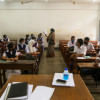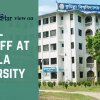Is more research funding the answer?

Drawing upon data from the Bangladesh Bureau of Statistics, a recent report by Bonik Barta highlighted the state of research funding in Bangladesh. The amount of such funding was shown as 0.3 percent of GDP (roughly equivalent to $628 million). According to the report, the highest amount of spending was in agriculture (appropriately so because hunger has serious political ramifications) at $330 million. The lowest spending was in the industry and technology sector, which comes as a surprise. The "entire" education sector, in second place, was allotted about $88 million. For perspective, recent research funding for Johns Hopkins University alone was $3.42 billion while that for the University of Michigan (Ann Arbor) was $1.77 billion.
According to one source the global economic giants spend a greater share of their "far greater" GDPs than Bangladesh on research (especially on cutting edge research). The US spends more than 3 percent of its GDP on research. The BRICS nations' research expenditures according to one source are as follows: Brazil (1.16 percent), Russia (1.04 percent), India (0.65 percent), China (2.2 percent), and South Africa (0.83 percent). The US and China outpace research spending by far, globally. The two countries are also economic and military giants. Comparatively, research spending by Bangladesh is miniscule. Nevertheless, the amount is not insignificant. Properly managed, even the current level of research expenditures can provide measurable output and impact.
The article in Bonik Barta seems to suggest that increasing expenditures on research is an immediate need according to several "experts." My personal position is that greater attention needs to be directed to the management of the current expenditures, driven by a clear set of agendas and goals. For example, in the education sector, the UGC may be hard pressed to articulate what research goals are in its purview, how much has been allocated by sector to the different research projects, the status of each project (apparently there is no proper reporting system), research allocations to public and private universities, and the impact that any funded research has delivered. Lack of management and administration of research, a specialised skill, is sorely missing. Officials at the UGC also speak in hushed tones about the political realities of research.
The fact is, Bangladesh needs to implement a comprehensive set of measures to become competent and innovative like the research-driven nations. Some of the essential strategies to consider include creating a supportive policy environment, strengthening research infrastructure, cultivating a culture of innovation, fostering industry-academia collaboration, improving research funding mechanisms, ensuring ethical research practices, leveraging existing data (across the various sectors), and monitoring, evaluation and regular reporting of progress in research. Each of these areas are rife with deficiencies that have remained in place for decades. For the sake of space and brevity, I shall focus on three immediate action items if research is to begin playing a meaningful role in the affairs of the nation.
Creating a supportive policy environment
• There is a clear need for a National R&D Strategy with clear (sectoral) goals, priorities, and funding mechanisms which are implemented robustly through an efficacious command and control system. In the Strategic Plan for Higher Education 2018-2030, for example, there was a clear mandate to establish a National Research Council (NRC) to oversee and direct higher education research in phase-1 and extend its services to other sectors in later phases. No one seems to know how to prioritise and proceed on this strong and vital recommendation.
• Incentives are imperative for innovation: these include tax incentives (for industries to invest in and pursue their research agendas), substantial targeted grants (and eliminating trivial allocations for the sake of equity) and introducing subsidies for private sector investment in R&D in a PPP mode.
• Intellectual property rights must be strengthened to protect innovations and encourage investment in research.
• Recognition for good research is another vital tool for encouraging critical investigations. A young researcher award may be introduced to encourage neophytes and to imbue in them the culture and value of research.
Strengthening research infrastructure
• Bangladesh is abysmally deficient in K-12 education. A large majority of the students are not even prepared for university education. Clearly, the proliferation of universities in the country is inconsistent with an ineffective K-12 output where progression in education is still based largely on rote memorisation, not creative or problem-solving modes of learning. Unless the K-12 base is strengthened, with a focus on STEM/STEAM (Science, Technology, Engineering, Arts, and Mathematics) fields, it will not help create research mindsets. Also, where are the teachers who can implement this transformation? This community must be strengthened first. A good step is to make the academic field a sought-after career, not as the choice of last resort, by "upgrading" the status and remuneration of those who choose to serve in this noble profession. It is worth mentioning that those who enjoy a higher status have been blessed in some way by their educators.
• For state-of-the-art research to flourish, specialised programmes and curricula must be developed that strengthen exposure to research methodologies and critical thinking skills. Two issues research students face even in the recognised institutions are: i) teachers do not want to share their knowledge of methodology and analytics; and ii) supervisors are not willing to give time; instead, they load unrelated work on the students to advance personal agendas.
• For research to proliferate, the ratio of PhD to non-PhD faculty must be strengthened and continuous professional development opportunities must be availed to researchers to stay updated with the latest advancements in knowledge and methodologies in their fields.
• To build world-class research institutions, their laboratories must be fully equipped, state-of-the-art facilities provided, and competent personnel selected to run their affairs. At the same time, the researchers must have access to modern technologies and resources for advanced research.
• A digital infrastructure to support data collection, analysis, and dissemination of research findings would be the icing on the cake.
Monitoring and evaluation
It's important to establish a robust set of metrics to track approved research projects. These metrics should capture various aspects of a project, from inputs and processes to outputs and impacts. Additionally, a dedicated entity should be established (e.g., the proposed NRC) to oversee the monitoring process, ensuring compliance, and facilitating comprehensive and reliable data collection and analysis.
Inputmetrics such as R&D expenditures, percentage of GDP allocated to R&D, public vs. private sector investment in R&D, and quality of human resources as researchers (especially their qualifications) should be regularly monitored. Process metrics include the number of ongoing research projects, interdisciplinary and collaborative research initiatives, as well as training and development (number of workshops and participation rates in professional development activities). Output metrics, to be made public, include theses and dissertations at the post-graduate level, publications (in peer-reviewed journals with impact factor and citations), and patents and innovations. Impact metrics are research specific: job creation; improvements in public health, education, and environmental sustainability; international collaborations; and rankings in various global indices.
An enduring buzz in academia is that it requires political connections to advance in one's career. This is a fundamental concern which saps the enthusiasm among academics from becoming creative and inquisitive researchers. Unless they are autonomous and free from political oversight and interference, research will not take off.
The UGC also needs to be completely reimagined because the people who run its affairs can make the difference. Instead of placing its governance under people nearing their retirement, serving only for a short duration (the revolving door phenomenon), and those who are deemed politically appropriate, the time has come for the UGC to be run by professionals who understand the importance of research and are competent in administering competitive research grants that make clear impact. These professionals must be selected competitively after meticulous scrutiny, not "recommended" by government officials or the political brass.
Thereafter, it is important to implement a holistic approach (not just funding) whereby Bangladesh can begin to create the right ecosystem for research and innovation. Fundamentally, however, education at K-12 requires a complete overhaul. Until then, increasing research budgets can make impact only through very selective and well-funded research.
Importantly, research in all sectors must be coordinated for synergy at some appropriate governmental level (the Planning Commission or the PMO) that has the political will and authority to drive innovation and change. For far too long, this important activity with ramifications for nation building has been allowed to drift without a clear purpose and a creative and demanding leadership.
Dr Syed Saad Andaleeb is distinguished professor emeritus at Pennsylvania State University and former vice chancellor of BRAC University.
Views expressed in this article are the author's own.
Follow The Daily Star Opinion on Facebook for the latest opinions, commentaries and analyses by experts and professionals. To contribute your article or letter to The Daily Star Opinion, see our guidelines for submission.

 For all latest news, follow The Daily Star's Google News channel.
For all latest news, follow The Daily Star's Google News channel. 










Comments